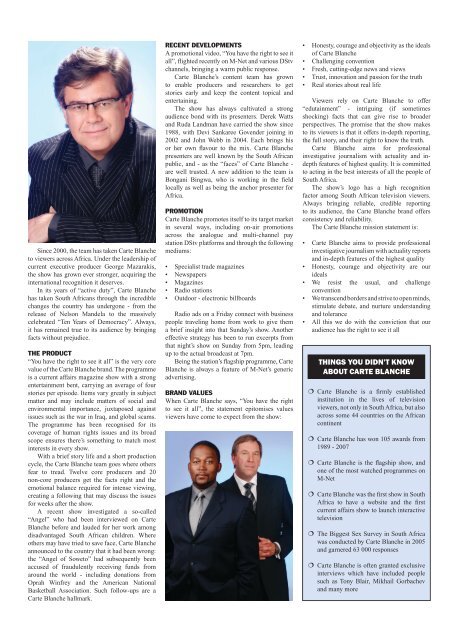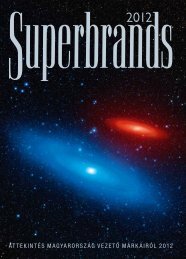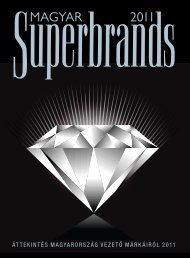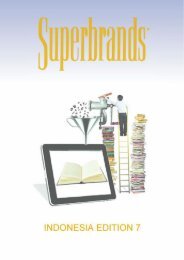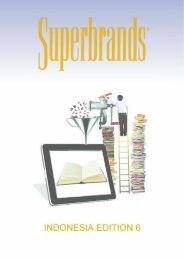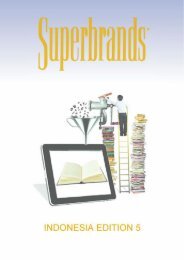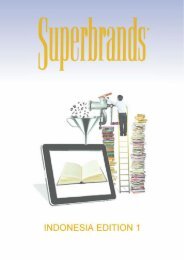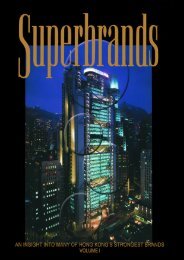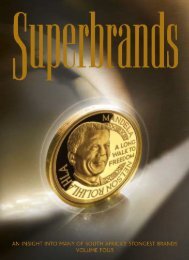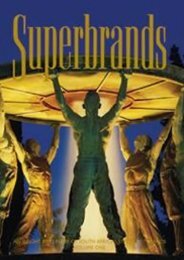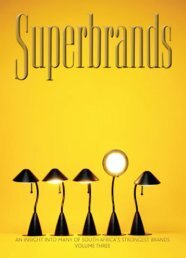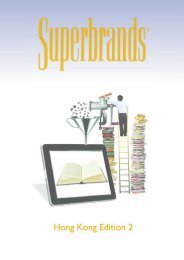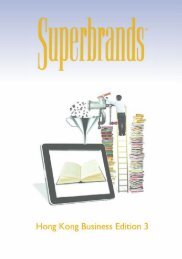South Africa Edition 2
Create successful ePaper yourself
Turn your PDF publications into a flip-book with our unique Google optimized e-Paper software.
Since 2000, the team has taken Carte Blanche<br />
to viewers across <strong>Africa</strong>. Under the leadership of<br />
current executive producer George Mazarakis,<br />
the show has grown ever stronger, acquiring the<br />
international recognition it deserves.<br />
In its years of “active duty”, Carte Blanche<br />
has taken <strong>South</strong> <strong>Africa</strong>ns through the incredible<br />
changes the country has undergone - from the<br />
release of Nelson Mandela to the massively<br />
celebrated “Ten Years of Democracy”. Always,<br />
it has remained true to its audience by bringing<br />
facts without prejudice.<br />
THE PRODUCT<br />
“You have the right to see it all” is the very core<br />
value of the Carte Blanche brand. The programme<br />
is a current affairs magazine show with a strong<br />
entertainment bent, carrying an average of four<br />
stories per episode. Items vary greatly in subject<br />
matter and may include matters of social and<br />
environmental importance, juxtaposed against<br />
issues such as the war in Iraq, and global scams.<br />
The programme has been recognised for its<br />
coverage of human rights issues and its broad<br />
scope ensures there’s something to match most<br />
interests in every show.<br />
With a brief story life and a short production<br />
cycle, the Carte Blanche team goes where others<br />
fear to tread. Twelve core producers and 20<br />
non-core producers get the facts right and the<br />
emotional balance required for intense viewing,<br />
creating a following that may discuss the issues<br />
for weeks after the show.<br />
A recent show investigated a so-called<br />
“Angel” who had been interviewed on Carte<br />
Blanche before and lauded for her work among<br />
disadvantaged <strong>South</strong> <strong>Africa</strong>n children. Where<br />
others may have tried to save face, Carte Blanche<br />
announced to the country that it had been wrong:<br />
the “Angel of Soweto” had subsequently been<br />
accused of fraudulently receiving funds from<br />
around the world - including donations from<br />
Oprah Winfrey and the American National<br />
Basketball Association. Such follow-ups are a<br />
Carte Blanche hallmark.<br />
RECENT DEVELOPMENTS<br />
A promotional video, “You have the right to see it<br />
all”, flighted recently on M-Net and various DStv<br />
channels, bringing a warm public response.<br />
Carte Blanche’s content team has grown<br />
to enable producers and researchers to get<br />
stories early and keep the content topical and<br />
entertaining.<br />
The show has always cultivated a strong<br />
audience bond with its presenters. Derek Watts<br />
and Ruda Landman have carried the show since<br />
1988, with Devi Sankaree Govender joining in<br />
2002 and John Webb in 2004. Each brings his<br />
or her own flavour to the mix. Carte Blanche<br />
presenters are well known by the <strong>South</strong> <strong>Africa</strong>n<br />
public, and - as the “faces” of Carte Blanche -<br />
are well trusted. A new addition to the team is<br />
Bongani Bingwa, who is working in the field<br />
locally as well as being the anchor presenter for<br />
<strong>Africa</strong>.<br />
PROMOTION<br />
Carte Blanche promotes itself to its target market<br />
in several ways, including on-air promotions<br />
across the analogue and multi-channel pay<br />
station DStv platforms and through the following<br />
mediums:<br />
• Specialist trade magazines<br />
• Newspapers<br />
• Magazines<br />
• Radio stations<br />
• Outdoor - electronic billboards<br />
Radio ads on a Friday connect with business<br />
people traveling home from work to give them<br />
a brief insight into that Sunday’s show. Another<br />
effective strategy has been to run excerpts from<br />
that night’s show on Sunday from 5pm, leading<br />
up to the actual broadcast at 7pm.<br />
Being the station’s flagship programme, Carte<br />
Blanche is always a feature of M-Net’s generic<br />
advertising.<br />
BRAND VALUES<br />
When Carte Blanche says, “You have the right<br />
to see it all”, the statement epitomises values<br />
viewers have come to expect from the show:<br />
• Honesty, courage and objectivity as the ideals<br />
of Carte Blanche<br />
• Challenging convention<br />
• Fresh, cutting-edge news and views<br />
• Trust, innovation and passion for the truth<br />
• Real stories about real life<br />
Viewers rely on Carte Blanche to offer<br />
“edutainment” - intriguing (if sometimes<br />
shocking) facts that can give rise to broader<br />
perspectives. The promise that the show makes<br />
to its viewers is that it offers in-depth reporting,<br />
the full story, and their right to know the truth.<br />
Carte Blanche aims for professional<br />
investigative journalism with actuality and indepth<br />
features of highest quality. It is committed<br />
to acting in the best interests of all the people of<br />
<strong>South</strong> <strong>Africa</strong>.<br />
The show’s logo has a high recognition<br />
factor among <strong>South</strong> <strong>Africa</strong>n television viewers.<br />
Always bringing reliable, credible reporting<br />
to its audience, the Carte Blanche brand offers<br />
consistency and reliability.<br />
The Carte Blanche mission statement is:<br />
• Carte Blanche aims to provide professional<br />
investigative journalism with actuality reports<br />
and in-depth features of the highest quality<br />
• Honesty, courage and objectivity are our<br />
ideals<br />
• We resist the usual, and challenge<br />
convention<br />
• We transcend borders and strive to open minds,<br />
stimulate debate, and nurture understanding<br />
and tolerance<br />
• All this we do with the conviction that our<br />
audience has the right to see it all<br />
THINGS YOU DIDN’T KNOW<br />
ABOUT CARTE BLANCHE<br />
Carte Blanche is a firmly established<br />
institution in the lives of television<br />
viewers, not only in <strong>South</strong> <strong>Africa</strong>, but also<br />
across some 44 countries on the <strong>Africa</strong>n<br />
continent<br />
Carte Blanche has won 105 awards from<br />
1989 - 2007<br />
Carte Blanche is the flagship show, and<br />
one of the most watched programmes on<br />
M-Net<br />
Carte Blanche was the first show in <strong>South</strong><br />
<strong>Africa</strong> to have a website and the first<br />
current affairs show to launch interactive<br />
television<br />
The Biggest Sex Survey in <strong>South</strong> <strong>Africa</strong><br />
was conducted by Carte Blanche in 2005<br />
and garnered 63 000 responses<br />
Carte Blanche is often granted exclusive<br />
interviews which have included people<br />
such as Tony Blair, Mikhail Gorbachev<br />
and many more


